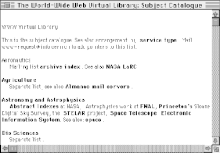 Screenshot of MacWWW | |
| Developer(s) | Robert Cailliau, Nicola Pellow[1] |
|---|---|
| Initial release | December 1992[2] |
| Final release | 1.03[3]
|
| Written in | THINK C[1] |
| Operating system | Classic Mac OS[1] System 6.0.5,[4] System 7[4] |
| Available in | English |
| Type | Web browser |
MacWWW, also known as Samba,[5][6][7] is an early minimalist web browser from 1992 meant to run on Macintosh computers. It was the first web browser for the classic Mac OS platform, and the first for any non-Unix operating system. MacWWW tries to emulate the design of WorldWideWeb.[5] Unlike modern browsers it opens each link in a new window only after a double-click.[3] It was a commercial product from CERN and cost 50 European Currency Units[6]
The browser is no longer available from its original ftp location, but can still be downloaded from mirrors.[A 1]
History
It was written at CERN by Robert Cailliau and later Nicola Pellow helped with the development.[5][7] Pellow worked originally on the Line Mode Browser and both browsers shared some parts of the source code after her switching.[1] Pre-alpha version were available, but this version worked only on "coliur [sic] mac but not on big black and white ones it seems."[2]
Version 1.00 was released on 12 May 1993 with the commentary: "We know there is much to be improved, but it works well on system 7 and system 6.0.5".[4]
Features
Clearly, this is a browser of limited usefulness, and one that was overtaken so quickly by every other graphical browser that loading it today is almost like stepping back into the dark ages. Interesting, but only as a curiosity.[3]
The MacWWW which was a minimalist browser displayed only text, no images nor lists.[8][3]
- Implemented in THINK C using its human interface objects.
- Uses much code in common with the Line Mode browser.[1] This code later became libwww.[2]
- bookmarks[3]
- For the hypertext object, the THINK C text object was modified to allow multifont capability, and to allow anchors to be encoded in the styles.[1]
According to critics, within a year the browser became obsolete because Mosaic and MacWeb had much more features, for example MacWWW showed no loading status.[3] Without the mouse and MacOS support MacWWW would be a text-mode browser.[3]
See also
Annotations
- ↑ The original ftp location at ftp://info.cern.ch/pub/www/bin/mac/%5B%5D is no longer available.
References
- 1 2 3 4 5 6 Berners-Lee, Tim (3 November 1992). "Macintosh Browser". World Wide Web Consortium. Retrieved 2 June 2010.
- 1 2 3 Berners-Lee, Tim (3 November 1992). "Macintosh Browser". World Wide Web Consortium. Retrieved 2 June 2010.
- 1 2 3 4 5 6 7 December, John; Randall, Neil (1994). The World Wide Web Unleashed. Sams Publishing. pp. 229–233. ISBN 0-672-30617-4.
- 1 2 3 Evans, Peter (7 September 2003). "Optimized for no one, but pretty much OK with . . ". Retrieved 3 June 2010.
- 1 2 3 Tim Berners-Lee. "Frequently asked questions – Robert Cailliau's role". World Wide Web Consortium. Retrieved 22 July 2010.
- 1 2 Engst, Adam C. (24 January 2000). "Chapter 25: Other Web-related Programs". Archived from the original on 5 May 2010. Retrieved 3 June 2010.
- 1 2 Stewart, Bill. "Web Browser History". Living Internet. Retrieved 2 June 2010.
- ↑ "Internet". Network World. IDG Network World Inc: 36. 22 August 1994.
External links
- MacWWW description and screenshot
- evolt.org – This browser archive has version 1.03 for download